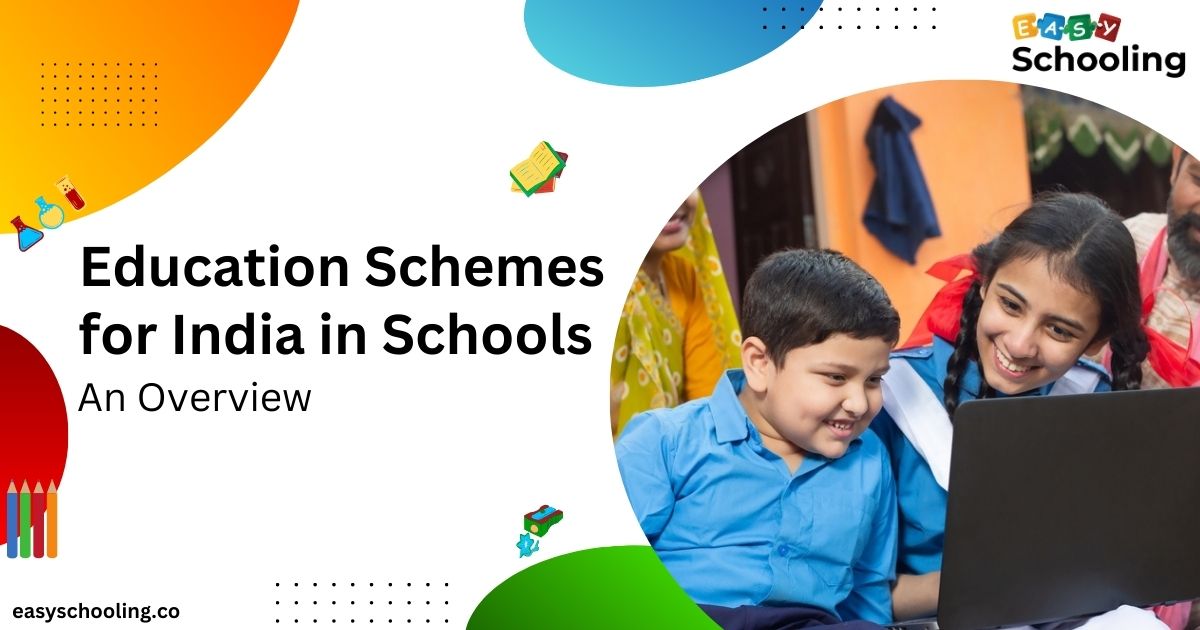India’s education system is continually evolving, integrating new schemes and initiatives to enhance learning opportunities for its burgeoning student population. Understanding the education schemes in India implemented within Indian schools is crucial to grasp the country’s educational landscape comprehensively.
Importance of Education Schemes in India
In recent years, India has witnessed a surge in educational reforms and innovative initiatives aimed at enhancing the quality of education across its diverse school systems. These schemes play a pivotal role in addressing various challenges and gaps prevalent in the educational framework, catering to the diverse needs of students across the country.
Prerequisites and Initiatives
Sarva Shiksha Abhiyan (SSA)
SSA, a flagship program, focuses on universalizing elementary education. It aims to provide free and compulsory education to children aged 6-14 years. The initiative emphasizes infrastructure development, teacher recruitment, and community participation to ensure equitable access to quality education.
Midday Meal Scheme
The Midday Meal Scheme is a significant initiative aimed at improving nutritional levels among school children. It provides free meals to students, promoting regular attendance and enhancing their overall health, thus positively impacting their academic performance.
Rashtriya Madhyamik Shiksha Abhiyan (RMSA)
RMSA aims to enhance secondary education by ensuring increased accessibility and quality. It focuses on infrastructure development, teacher training, curriculum enhancement, and providing vocational education, preparing students for higher education and the workforce.
National Programme for Education of Girls at Elementary Level (NPEGEL)
NPEGEL aims to reduce gender disparities in elementary education. This initiative provides additional support for girls’ education, including infrastructure development, scholarships, and interventions to improve retention and learning outcomes.
Innovations in Educational Technology
Digital India Initiative
With the proliferation of technology, India’s education sector has embraced the Digital India initiative. Integrating digital learning platforms, smart classrooms, and e-content, this initiative aims to enhance accessibility, making learning more engaging and inclusive.
SWAYAM
SWAYAM, India’s online education platform, offers free courses by eminent educators and institutions. It caters to various subjects and levels, promoting lifelong learning and skill development among students and professionals.
Challenges and Future Prospects
While these schemes and initiatives have significantly contributed to India’s education sector, challenges persist. Issues such as uneven implementation, infrastructure gaps, and quality disparities need continuous attention and reform for a more robust and equitable education system.
Strengthening Education: Addressing Challenges and Implementing Reforms
Addressing Infrastructure Gaps
Infrastructure deficiencies persist in many regions, affecting the quality of education. The government has initiated measures to bridge these gaps by constructing schools, providing necessary facilities like libraries, laboratories, and ensuring access to clean water and sanitation.
Quality Enhancement Programs
Teacher training programs, vocational training programs, and curriculum revisions have been implemented to improve teaching standards and update study materials. These initiatives aim to align educational practices with modern teaching methodologies and global standards.
Focus on Inclusive Education
Efforts towards inclusive education are gaining traction. Specialized programs cater to students with disabilities, ensuring they receive adequate support and access to mainstream education, fostering an inclusive learning environment.
Skill Development Initiatives
Recognizing the significance of skill-based education, various schemes emphasize vocational training, equipping students with practical skills essential for future employment opportunities.
Digital Literacy and Connectivity
Enhancing digital literacy and ensuring internet connectivity in remote areas remain focal points. The government is actively pursuing strategies to provide internet access and technological resources, fostering digital inclusion across all educational levels.
Collaborative Partnerships
Public-private partnerships play a crucial role in supplementing government efforts. Collaboration with NGOs, private institutions, and international organizations bolsters resources, enriching the educational landscape and expanding outreach.
Future Prospects and Policy Frameworks
Continual evaluation and refinement of existing policies are imperative. Formulating robust policy frameworks that address emerging challenges and align with global educational benchmarks is pivotal for sustained growth and progress.
Evolutionary Trends and Global Adaptation
Embracing Global Best Practices
India’s educational ecosystem is increasingly aligning with international best practices. This includes benchmarking curriculum structures, pedagogical methodologies, and assessment systems to meet global standards.
Research and Development Initiatives
R&D investments in education are pivotal for sustained growth. Encouraging research-oriented education fosters innovation, critical thinking, and problem-solving skills among students, contributing to societal and economic advancements.
Addressing Socio-Economic Disparities
Government initiatives targeting rural and economically disadvantaged areas aim to bridge educational disparities. Scholarships, free educational resources, and tailored programs uplift underprivileged students, promoting social equity.
Environmental Education and Sustainability
Recognizing the significance of environmental education, initiatives integrating sustainable practices into curricula promote ecological awareness, encouraging students to become responsible global citizens.
Parental and Community Involvement
Engaging parents and communities in the educational process is integral. Collaborative efforts bolster students’ holistic development, fostering a supportive ecosystem conducive to learning.
Health and Well-being Integration
Education schemes in India now emphasize mental health and well-being. Holistic education encompasses physical and emotional wellness, ensuring students’ overall development.
Continuous Learning Paradigm
The concept of lifelong learning is gaining traction. Education schemes in India prioritize skill enhancement and knowledge acquisition beyond formal education, empowering individuals for continual personal and professional growth.
Adaptability in the Face of Challenges
The educational landscape faces dynamic challenges, including the recent global health crisis. Adapting swiftly through online learning platforms and innovative teaching methodologies demonstrates resilience in maintaining educational continuity.
Looking Ahead: A Transformative Journey
India’s commitment to education reform is an ongoing journey. By embracing innovation, inclusivity, and adaptability, the nation is poised to nurture a well-educated populace, driving progress and sustainable development.
Conclusion: A Brighter Educational Future
India’s education system is on an evolutionary path, propelled by innovative schemes and comprehensive initiatives. Despite persistent challenges, the concerted efforts towards inclusive and quality education signify a promising future for the nation’s youth.
The dynamic nature of education schemes in India reflects a commitment to equipping learners with the skills and knowledge necessary for a competitive global landscape.
This comprehensive overview sheds light on the multifaceted aspects of India’s education schemes, underscoring their significance in shaping the nation’s future. Learn more from easyschooling.co.
